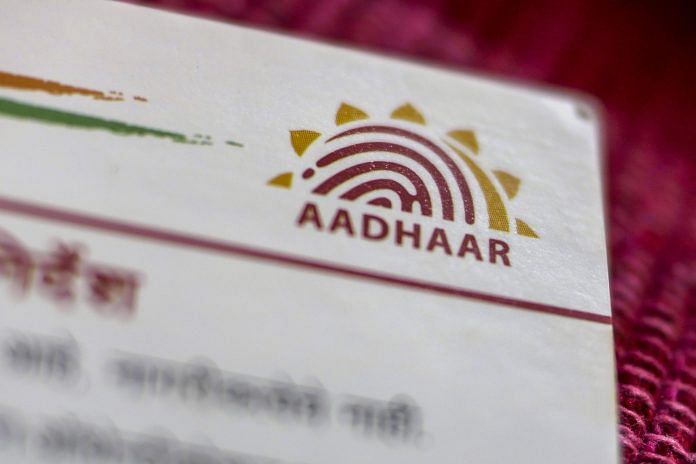Aadhaar debate isn’t over yet. The government must improve its implementation if it wants to save the project’s credibility.
The Supreme Court judgment on Aadhaar Wednesday suggests a middle ground has been found. There’s been some give and take, and the apex court has balanced the government’s objectives with the concerns raised by activists.
There are two aspects of the Aadhaar debate: Aadhaar as an idea, and the actual practice of Aadhaar. Supporters and critics of Aadhaar have been primarily vested in the ideological battle of ‘technology versus privacy’. Both sides use issues around Aadhaar’s implementation in support of their ideological positions.
The Technology-wallahs say Aadhaar is a good idea, never mind the minor hiccups in implementation. The Privacy-wallahs say Aadhaar is a bad idea, and if you need proof, just look at the issues with the implementation.
Also read: On privacy, Supreme Court’s Aadhaar verdict doesn’t even engage with the concerns
There’s hardly anybody to make the case for Aadhaar as a good idea implemented badly.
The Supreme Court judgment doesn’t do that either. It gives some concession to the government and the Technology-wallahs by upholding the idea of biometric identity as unique. The judgment thus allows the use of Aadhaar for government subsidies and Income Tax return filing. At the same time, the court found it excessive that Aadhaar had to be linked with people’s phone or bank accounts, or was needed for pensions. The court also toned down some of the overreach of the Aadhaar Act, bringing down the data retention from five years to six months, and so on.
Dismissing the issue of exclusion from benefits such as subsidised food grains, the court felt such omission was minimal. These gaps needed to be plugged, the court said, instead of throwing the baby out with the bath water.
Technology without humanity
From the very beginning, the government has appeared to push through the implementation of Aadhaar. The implementation has been so undemocratic that it makes it very difficult to defend Aadhaar.
Why was Aadhaar enrolment begun without a law? Why was the Aadhaar law passed without first passing laws for privacy and data protection? In fact, the Modi government actually argued against the right to privacy in the Supreme Court. The court Wednesday asked the government to pass a data protection law as soon as possible, but the Modi government doesn’t appear to be in a hurry.
When the Aadhaar Act was finally passed, it was rammed through the Rajya Sabha as a money bill, so that the Rajya Sabha could not stall it. It has many troubling provisions, some of which were struck down by the court Wednesday.
Also read: Our privacy can’t be stripped for right to life- What lone dissenting judge said on Aadhaar Act
The government has been consistently ignoring the Supreme Court’s interim orders on Aadhaar, and many of its assurances have been on paper. So what if the fingerprints don’t match, the government argues, there’s also the iris scan. Cut to reality: how many places have you seen an iris scanner in? Your mobile operator or your bank has the fingerprint scanner. If your fingerprint doesn’t match, bad luck, go to an Aadhaar enrolment centre and update your biometrics. While you do that, please go hungry. No subsidised food grains for you.
Does that make any sense? If Aadhaar critics have been called Luddite, Aadhaar supporters are guilty of putting technology over humanity.
Of course the UIDAI will say nobody is being denied anything, but on the ground that’s not true. Don’t listen to the Aadhaar critics. Just see the news reports, thousands of them over the past few years, on the problem of actual Aadhaar implementation.
Almost everybody’s got an Aadhaar number by now. But people have been made to run from pillar to post to get it linked, and there have been problems aplenty in the linking. The poor, the elderly, the vulnerable have been going through enormous suffering for the arbitrary, heartless deadlines to link Aadhaar to this service or that, or else.
What is the need to let people die of starvation if they can’t link their Aadhaar to their ration cards in a hurry?
Why make the elderly run around for Aadhaar linking to get their hard-earned pensions?
In theory, UIDAI says it has provisions for the disabled but in practice, they’ve been punished by Aadhaar.
Aadhaar was supposed to be secure but there’ve been many cases of data breaches. Aadhaar with OTP verification over mobile phones has helped people swindle money from the banks. The UIDAI’s response has been to deny these problems, shift the blame, and even hound activists raising such concerns.
The middle ground
As the Supreme Court has upheld Aadhaar for subsidies, central and state governments will continue to be at war with the poor to catch up with the unique id. The government does not seem to think it has the responsibility to make its new technology work smoothly, and provide the physical infrastructure for Aadhaar in the vicinity of every Indian. Instead, it has shifted the burden of catching up with technology on the people.
The middle ground on Aadhaar would acknowledge that such massive shift to a new technology needs to be done with humanity. Don’t kill people just because you have a deadline to meet. Instead of making Aadhaar mandatory for everything, make it incentive based. Bring privacy and data protection laws, assure people.
Also read: The lazy person’s guide to the Supreme Court’s landmark Aadhaar judgment
Even after the Supreme Court judgment, the credibility of Aadhaar — and future legal challenges to it — will depend on whether the government can introduce some humanity in its push for technology.



